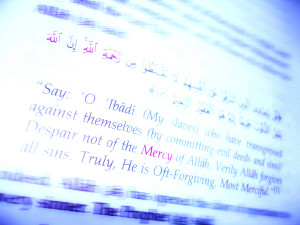The Holy Qur’an says: “Are they looking for (seeking) a religion other than the religion of God (Deen of Allah), knowing well that all creatures in the heavens and on earth, willingly or unwillingly, have submitted to Him.” [Qur’an 3:83]
The words “have submitted to Him” are “bowed to His Will (Accepted Islam) …” in the Yousuf Ali translation:-
• “Deen” does not mean religion in the limited sense that it is used in the English language, but in the sense of a ‘way of life’.
• What then, is this “Deen of Allah”? The Qur’an itself at another place makes it clear that: “Surely the only Deen (true religion and the Right way of Life) in the sight of Allah is Al-Islam (submission to His Will)”. [Qur’an 3:19]
• Islam is a complete code of conduct and it regulates every aspect of life. By reading these two verses together, it becomes obvious that Islam means submission to the Will of God as expressed through His “law” to which the whole creation submits:
 • • the laws which govern Nature are known as Laws of Nature, e.g. law of physics etc. as is evident from the smooth running of the affairs of Natural World, e.g. the systems of day and night, the oceans and the rivers and the administration of the whole universe. The laws which govern man are known as Laws of morality or Shariah. The law of cause and effect brings about the creative phenomenon of Nature. The same law of cause and effect also governs the law of man in that man’s actions are the cause that brings about the effect/result of punishment. In other words, the whole system of reward and punishment is nothing but the effect of the consequence of the cause which occurs in the form of man’s choice of good and evil action.
• • the laws which govern Nature are known as Laws of Nature, e.g. law of physics etc. as is evident from the smooth running of the affairs of Natural World, e.g. the systems of day and night, the oceans and the rivers and the administration of the whole universe. The laws which govern man are known as Laws of morality or Shariah. The law of cause and effect brings about the creative phenomenon of Nature. The same law of cause and effect also governs the law of man in that man’s actions are the cause that brings about the effect/result of punishment. In other words, the whole system of reward and punishment is nothing but the effect of the consequence of the cause which occurs in the form of man’s choice of good and evil action.
Abu Hanifa defines it as: “The science of the rights and obligations of man”
• For Islam and Muslims, the Real Sovereign, of course, is none other than God. The primary and the only real source of law, therefore, is none other than the Divine Source, namely the Qur’an, as revealed to the human messenger, the Prophet Muhammad (p.b.u.h.) through the intermediary celestial messenger, the angel Gabriel.
Prophet Muhammad, (p.b.u.h.), in his capacity as the divinely appointed official interpreter to explain and elaborate and put into practice the Qur’anic law, thus becomes the logical second source of the Islamic Law.
The first component of the Law of Islam comprising of the Qur’an and the Sunnah of the Prophet (p.b.u.h.) are jointly referred to as the Shariah. The second component of the Muslim law is known as Fiqh. Jointly, taken together these two components constitute one whole – a complete code of Muslim jurisprudence. As a complete way of life, a deen, it contains all that is needed for the guidance of humanity which covers not only the material, but also the spiritual needs of man which are usually referred to as the well-being in this world and the world of the Hereafter.
 navedz.com a muslim's Quest for the truth
navedz.com a muslim's Quest for the truth







this is great!
this is great stuff which all muslims including me should learn and be educated about because it is grreat info. most of this..muslims of now days are not following but im sure if all the great muslims put their hearts to it and read this they will remember again what islam really means and how we do the job of making islam popular and making it the best!